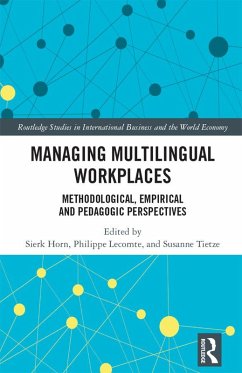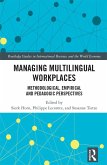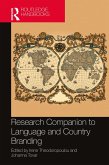Managing Multilingual Workplaces (eBook, ePUB)
Methodological, Empirical and Pedagogic Perspectives
Redaktion: Horn, Sierk; Tietze, Susanne; Lecomte, Philippe
42,95 €
42,95 €
inkl. MwSt.
Sofort per Download lieferbar

21 °P sammeln
42,95 €
Als Download kaufen

42,95 €
inkl. MwSt.
Sofort per Download lieferbar

21 °P sammeln
Jetzt verschenken
Alle Infos zum eBook verschenken
42,95 €
inkl. MwSt.
Sofort per Download lieferbar
Alle Infos zum eBook verschenken

21 °P sammeln
Managing Multilingual Workplaces (eBook, ePUB)
Methodological, Empirical and Pedagogic Perspectives
Redaktion: Horn, Sierk; Tietze, Susanne; Lecomte, Philippe
- Format: ePub
- Merkliste
- Auf die Merkliste
- Bewerten Bewerten
- Teilen
- Produkt teilen
- Produkterinnerung
- Produkterinnerung

Bitte loggen Sie sich zunächst in Ihr Kundenkonto ein oder registrieren Sie sich bei
bücher.de, um das eBook-Abo tolino select nutzen zu können.
Hier können Sie sich einloggen
Hier können Sie sich einloggen
Sie sind bereits eingeloggt. Klicken Sie auf 2. tolino select Abo, um fortzufahren.

Bitte loggen Sie sich zunächst in Ihr Kundenkonto ein oder registrieren Sie sich bei bücher.de, um das eBook-Abo tolino select nutzen zu können.
This book provides a source that unites insights from multilingual empirical research, methodological considerations and pedagogic practice in order to advance knowledge and debate.
- Geräte: eReader
- ohne Kopierschutz
- eBook Hilfe
- Größe: 2.38MB
Andere Kunden interessierten sich auch für
![Managing Multilingual Workplaces (eBook, PDF) Managing Multilingual Workplaces (eBook, PDF)]() Managing Multilingual Workplaces (eBook, PDF)42,95 €
Managing Multilingual Workplaces (eBook, PDF)42,95 €![Academic Irregularities (eBook, ePUB) Academic Irregularities (eBook, ePUB)]() Liz MorrishAcademic Irregularities (eBook, ePUB)44,95 €
Liz MorrishAcademic Irregularities (eBook, ePUB)44,95 €![The Language of Branding (eBook, ePUB) The Language of Branding (eBook, ePUB)]() Dawn LermanThe Language of Branding (eBook, ePUB)50,95 €
Dawn LermanThe Language of Branding (eBook, ePUB)50,95 €![The Economics of the Multilingual Workplace (eBook, ePUB) The Economics of the Multilingual Workplace (eBook, ePUB)]() François GrinThe Economics of the Multilingual Workplace (eBook, ePUB)56,95 €
François GrinThe Economics of the Multilingual Workplace (eBook, ePUB)56,95 €![The Language of Leadership Narratives (eBook, ePUB) The Language of Leadership Narratives (eBook, ePUB)]() Jonathan CliftonThe Language of Leadership Narratives (eBook, ePUB)40,95 €
Jonathan CliftonThe Language of Leadership Narratives (eBook, ePUB)40,95 €![The Language of Money (eBook, ePUB) The Language of Money (eBook, ePUB)]() Annabelle MooneyThe Language of Money (eBook, ePUB)45,95 €
Annabelle MooneyThe Language of Money (eBook, ePUB)45,95 €![Research Companion to Language and Country Branding (eBook, ePUB) Research Companion to Language and Country Branding (eBook, ePUB)]() Research Companion to Language and Country Branding (eBook, ePUB)46,95 €
Research Companion to Language and Country Branding (eBook, ePUB)46,95 €-
-
-
This book provides a source that unites insights from multilingual empirical research, methodological considerations and pedagogic practice in order to advance knowledge and debate.
Dieser Download kann aus rechtlichen Gründen nur mit Rechnungsadresse in A, B, BG, CY, CZ, D, DK, EW, E, FIN, F, GR, HR, H, IRL, I, LT, L, LR, M, NL, PL, P, R, S, SLO, SK ausgeliefert werden.
Produktdetails
- Produktdetails
- Verlag: Taylor & Francis eBooks
- Seitenzahl: 264
- Erscheinungstermin: 11. Juni 2020
- Englisch
- ISBN-13: 9780429775031
- Artikelnr.: 59601816
- Verlag: Taylor & Francis eBooks
- Seitenzahl: 264
- Erscheinungstermin: 11. Juni 2020
- Englisch
- ISBN-13: 9780429775031
- Artikelnr.: 59601816
- Herstellerkennzeichnung Die Herstellerinformationen sind derzeit nicht verfügbar.
Sierk Horn is Professor of International Management at the FH Vorarlberg, University of Applied Sciences, Austria. Until 2017 he held the Professorship of the Economy of Japan at Ludwig-Maximilian-University, Munich. Philippe Lecomte is President and founding member of GEM&L. He has been Associate Professor at Toulouse Business School (TBS), France, for over 30 years. His current research interest is on language in international business and management education. Susanne Tietze is Professor of Multilingual Management at Sheffield Hallam University, Sheffield Business School. She has a particular interest in translation as a method and concept to understand transformational process.
Keynote foreword: Understanding Multilingual Workplaces;
DENICE AND LAWRENCE WELCH;
Preface;
SIERK HORN, PHILIPPE LECOMTE AND SUSANNE TIETZE;
SECTION 1: METHODS AND METHODOLOGIES IN MULTILINGUAL RESEARCH;
General introduction: New Perspectives and Approaches to Language-based
Research;
Chapter 1: Moving beyond the baseline: Exploring the potential of
experiments in language research.;
Chapter 2: How to Research 'Empowerment' in Russia: Absence, Equivalence
and Method;
Chapter 3: Translating Western Research Methodology into Chinese: A
Contextualised Approach in Practice;
Chapter 4: Translatorial Linguistic Ethnography in Organizations;
SECTION 2: EMPIRICAL RESEARCH ON LANGUAGE AT WORK;
Introduction to section 2: Innovation in empirical studies: The
individual's reflexivity;
Chapter 5: The impact of language diversity on multinational teamwork.;
Chapter 6: Exploring Translanguaging in International Business. Towards a
Comparison of Highly Context-embedded Practices: Evidence from France and
Finland.;
Chapter 7: Towards a Framework of Individuals' Responses to Language
Asymmetry;
Chapter 8: Learning in a Multilingual and Multicultural Business Setting:
Polish Expatriates' Stories of Critical Incidents in China.;
SECTION 3: THE ROLE OF LANGUAGE IN INTERNATIONAL BUSINESS EDUCATION;
Introduction to section 3: A New Look at the Role of Language in Business
Education;
Chapter 9: "At the Beginning, I Thought the Topic was Boring": Educating
Business Students in Language Diversity through Transformative Learning;
Chapter 10: Language Management in the Global Firm: Transforming Research
into Education;
Chapter 11: From the Multilingual Classroom to the Multilingual Workplace:
Learning to View Language through a Different Lens.;
SECTION 4: CONCLUSION;
DENICE AND LAWRENCE WELCH;
Preface;
SIERK HORN, PHILIPPE LECOMTE AND SUSANNE TIETZE;
SECTION 1: METHODS AND METHODOLOGIES IN MULTILINGUAL RESEARCH;
General introduction: New Perspectives and Approaches to Language-based
Research;
Chapter 1: Moving beyond the baseline: Exploring the potential of
experiments in language research.;
Chapter 2: How to Research 'Empowerment' in Russia: Absence, Equivalence
and Method;
Chapter 3: Translating Western Research Methodology into Chinese: A
Contextualised Approach in Practice;
Chapter 4: Translatorial Linguistic Ethnography in Organizations;
SECTION 2: EMPIRICAL RESEARCH ON LANGUAGE AT WORK;
Introduction to section 2: Innovation in empirical studies: The
individual's reflexivity;
Chapter 5: The impact of language diversity on multinational teamwork.;
Chapter 6: Exploring Translanguaging in International Business. Towards a
Comparison of Highly Context-embedded Practices: Evidence from France and
Finland.;
Chapter 7: Towards a Framework of Individuals' Responses to Language
Asymmetry;
Chapter 8: Learning in a Multilingual and Multicultural Business Setting:
Polish Expatriates' Stories of Critical Incidents in China.;
SECTION 3: THE ROLE OF LANGUAGE IN INTERNATIONAL BUSINESS EDUCATION;
Introduction to section 3: A New Look at the Role of Language in Business
Education;
Chapter 9: "At the Beginning, I Thought the Topic was Boring": Educating
Business Students in Language Diversity through Transformative Learning;
Chapter 10: Language Management in the Global Firm: Transforming Research
into Education;
Chapter 11: From the Multilingual Classroom to the Multilingual Workplace:
Learning to View Language through a Different Lens.;
SECTION 4: CONCLUSION;
Keynote foreword: Understanding Multilingual Workplaces;
DENICE AND LAWRENCE WELCH;
Preface;
SIERK HORN, PHILIPPE LECOMTE AND SUSANNE TIETZE;
SECTION 1: METHODS AND METHODOLOGIES IN MULTILINGUAL RESEARCH;
General introduction: New Perspectives and Approaches to Language-based
Research;
Chapter 1: Moving beyond the baseline: Exploring the potential of
experiments in language research.;
Chapter 2: How to Research 'Empowerment' in Russia: Absence, Equivalence
and Method;
Chapter 3: Translating Western Research Methodology into Chinese: A
Contextualised Approach in Practice;
Chapter 4: Translatorial Linguistic Ethnography in Organizations;
SECTION 2: EMPIRICAL RESEARCH ON LANGUAGE AT WORK;
Introduction to section 2: Innovation in empirical studies: The
individual's reflexivity;
Chapter 5: The impact of language diversity on multinational teamwork.;
Chapter 6: Exploring Translanguaging in International Business. Towards a
Comparison of Highly Context-embedded Practices: Evidence from France and
Finland.;
Chapter 7: Towards a Framework of Individuals' Responses to Language
Asymmetry;
Chapter 8: Learning in a Multilingual and Multicultural Business Setting:
Polish Expatriates' Stories of Critical Incidents in China.;
SECTION 3: THE ROLE OF LANGUAGE IN INTERNATIONAL BUSINESS EDUCATION;
Introduction to section 3: A New Look at the Role of Language in Business
Education;
Chapter 9: "At the Beginning, I Thought the Topic was Boring": Educating
Business Students in Language Diversity through Transformative Learning;
Chapter 10: Language Management in the Global Firm: Transforming Research
into Education;
Chapter 11: From the Multilingual Classroom to the Multilingual Workplace:
Learning to View Language through a Different Lens.;
SECTION 4: CONCLUSION;
DENICE AND LAWRENCE WELCH;
Preface;
SIERK HORN, PHILIPPE LECOMTE AND SUSANNE TIETZE;
SECTION 1: METHODS AND METHODOLOGIES IN MULTILINGUAL RESEARCH;
General introduction: New Perspectives and Approaches to Language-based
Research;
Chapter 1: Moving beyond the baseline: Exploring the potential of
experiments in language research.;
Chapter 2: How to Research 'Empowerment' in Russia: Absence, Equivalence
and Method;
Chapter 3: Translating Western Research Methodology into Chinese: A
Contextualised Approach in Practice;
Chapter 4: Translatorial Linguistic Ethnography in Organizations;
SECTION 2: EMPIRICAL RESEARCH ON LANGUAGE AT WORK;
Introduction to section 2: Innovation in empirical studies: The
individual's reflexivity;
Chapter 5: The impact of language diversity on multinational teamwork.;
Chapter 6: Exploring Translanguaging in International Business. Towards a
Comparison of Highly Context-embedded Practices: Evidence from France and
Finland.;
Chapter 7: Towards a Framework of Individuals' Responses to Language
Asymmetry;
Chapter 8: Learning in a Multilingual and Multicultural Business Setting:
Polish Expatriates' Stories of Critical Incidents in China.;
SECTION 3: THE ROLE OF LANGUAGE IN INTERNATIONAL BUSINESS EDUCATION;
Introduction to section 3: A New Look at the Role of Language in Business
Education;
Chapter 9: "At the Beginning, I Thought the Topic was Boring": Educating
Business Students in Language Diversity through Transformative Learning;
Chapter 10: Language Management in the Global Firm: Transforming Research
into Education;
Chapter 11: From the Multilingual Classroom to the Multilingual Workplace:
Learning to View Language through a Different Lens.;
SECTION 4: CONCLUSION;







